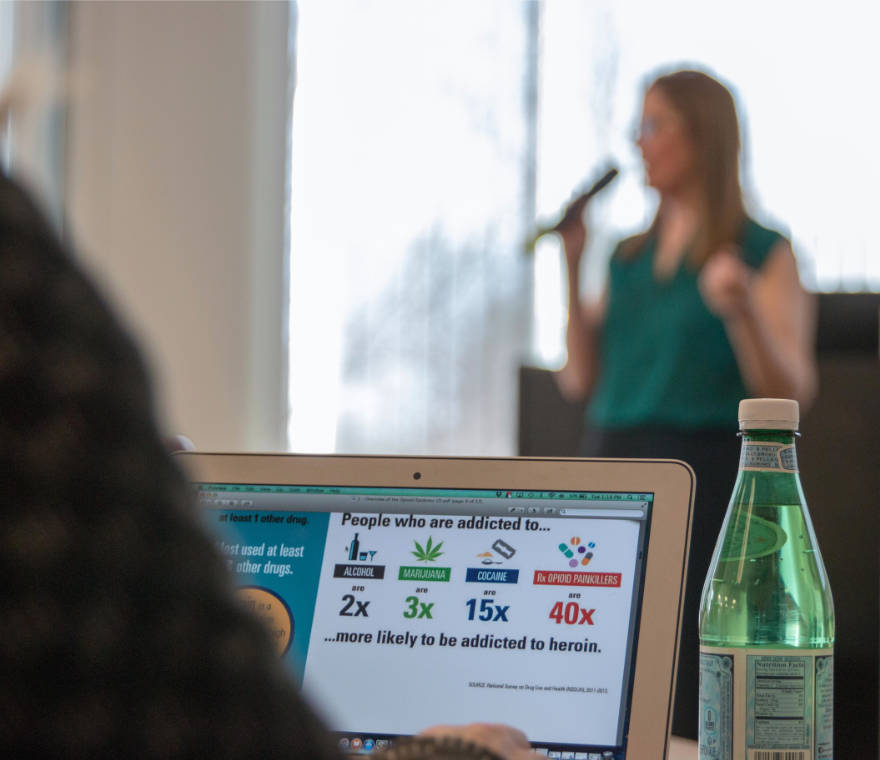A Resource for Healthcare and Social Services Professionals
Attend a free live training event! Browse trainings by topic, month, or event format (virtual or in-person), and then be sure to register online. Please note this list of upcoming trainings is updated regularly. If you do not see a specific training listed below, please check back or email us with any questions. If you want to be notified of newly booked trainings, subscribe to our mailing list.

DEA-eligible
Topic: Recovery Coach Drop-in Forum
A drop-in session for recovery coaches to discuss coaching and other topics related to substance use, recovery, and coaching. This group is only open to recovery coaches and peer support specialists - please respect these requirements as this is a dedicated and protected space for those in the field needing support.
 |
Thursday, 12/12/2024 12:00 pm – 1:00 pm ET |
 |
Virtual event |
 |
Intended AudienceRecovery coaches and peer support specialists who provide direct support to recoverees/patients in the field of addiction. We respectfully ask that those in supervisory roles not attend these sessions – thank you for your understanding. |
Topic: Office Hours
A virtual open forum session where clinical providers and staff supporting those with substance use can drop in with addiction-related questions or brief de-identified challenging cases for discussion.
 |
Thursday, 12/12/2024 5:00 pm – 6:00 pm ET |
 |
Virtual event |
 |
Intended AudienceClinical providers and staff supporting those with substance use. |
Topic: Nurse Care Manager Model
This two-hour, virtual course is designed to provide a history of the nurse care manager (NCM) model of office-based addiction treatment, explain how the model increases treatment access, and identify the roles of the nurse manager and interprofessional care team members to sustain the model. Participants will recognize the NCM as an advocate and a source of evidence-based treatment for teams and community partners. Participants will also develop an understanding of workflows to sustain the daily operations of the NCM model.
 |
Friday, 12/13/2024 9:00 am – 11:00 am ET |
 |
Virtual event |
 |
Intended AudienceNurses, Social Workers, LMHCs, LADCs, CADCs, and anyone who works patients with substance use disorder. |
Topic: Alcohol
The holiday season can be challenging and stressful when trying to navigate the pressures associated with this time of the year. For many, alcohol consumption significantly increases between Thanksgiving and New Years for a variety of reasons, including family dynamics, increased social gatherings, holiday traditions, and increased feelings of loneliness, sadness, or isolation. This training will review strategies on how to avoid or reduce alcohol consumption, as well as discuss techniques for how to talk about one’s alcohol use during a particularly stressful time of year.
 |
Friday, 12/13/2024 12:00 pm – 1:30 pm ET |
 |
This training fulfills the DEA's 8-hour training requirement for prescribers |
 |
Virtual event |
 |
Intended AudienceProviders, nurses, social workers, other clinical staff, and non-clinicians. |
Topic: ECHO
As part of the twice-monthly SUD Care Continuum ECHO® series, Emily Hurstak, MD, MPH, MAS and Dan Alford, MD, MPH will present a didactic about treatments for pain in the context of substance use disorder. The didactic will be followed by a de-identified patient case presentation from an ECHO® participant and recommendations from the panel of experts and attendees. All disciplines are welcome.
 |
Wednesday, 12/18/2024 12:00 pm – 1:15 pm ET |
 |
Virtual event |
 |
Intended AudienceProviders, nurses, social workers, psychologists, peer supports, other clinical staff, and non-clinicians. |
Topic: Stimulants
This training provides an introduction to stimulant use disorder, including evidence-informed treatments and interventions.
 |
Thursday, 12/19/2024 10:00 am – 11:00 am ET |
 |
This training fulfills the DEA's 8-hour training requirement for prescribers |
 |
Virtual event |
 |
Intended AudienceProviders, nurses, social workers, psychologists, peer supports, other clinical staff, and non-clinicians. |
Topic: Family & Social Supports
This training will highlight the importance of family and social support for people with SUD. The importance of evidence-based resources for families will be explained, and concrete and simple changes to current models of addiction treatment to engage the family will be introduced.
 |
Thursday, 12/19/2024 12:00 pm – 1:00 pm ET |
 |
This training fulfills the DEA's 8-hour training requirement for prescribers |
 |
Virtual event |
 |
Intended AudienceAll medical and non-medical staff seeking to learn about the role of the family in addiction treatment are encouraged to attend. |
Topic: Recovery Coach Drop-in Forum
A drop-in session for recovery coaches to discuss coaching and other topics related to substance use, recovery, and coaching. This group is only open to recovery coaches and peer support specialists - please respect these requirements as this is a dedicated and protected space for those in the field needing support.
 |
Thursday, 12/19/2024 12:00 pm – 1:00 pm ET |
 |
Virtual event |
 |
Intended AudienceRecovery coaches and peer support specialists who provide direct support to recoverees/patients in the field of addiction. We respectfully ask that those in supervisory roles not attend these sessions – thank you for your understanding. |
Topic: Office Hours
A virtual open forum session where clinical providers and staff supporting those with substance use can drop in with addiction and stimulant-related questions or brief de-identified challenging cases for discussion.
 |
Thursday, 12/19/2024 5:00 pm – 6:00 pm ET |
 |
Virtual event |
 |
Intended AudienceClinical providers and staff supporting those with substance use. |
Topic: Wound Care
This training is designed to equip addiction medical treatment teams with the basics of wound assessment and treatment. Topics covered include assessment of wound tissue type, drainage, cleansing, dressing supplies, special considerations for loop drains, and xylazine-related wounds.
 |
Friday, 12/20/2024 12:00 pm – 1:00 pm ET |
 |
Virtual event |
 |
Intended AudienceProviders, nurses, social workers, psychologists, peer supports, other clinical staff, and non-clinicians |